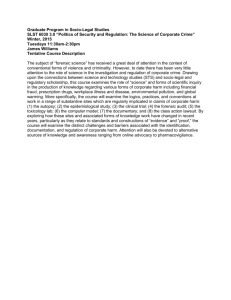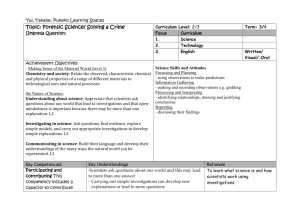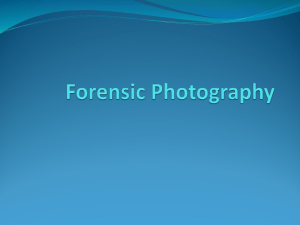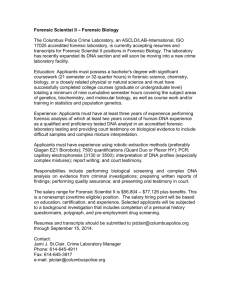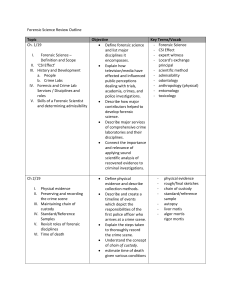JOB DESCRIPTION - Cleveland Police
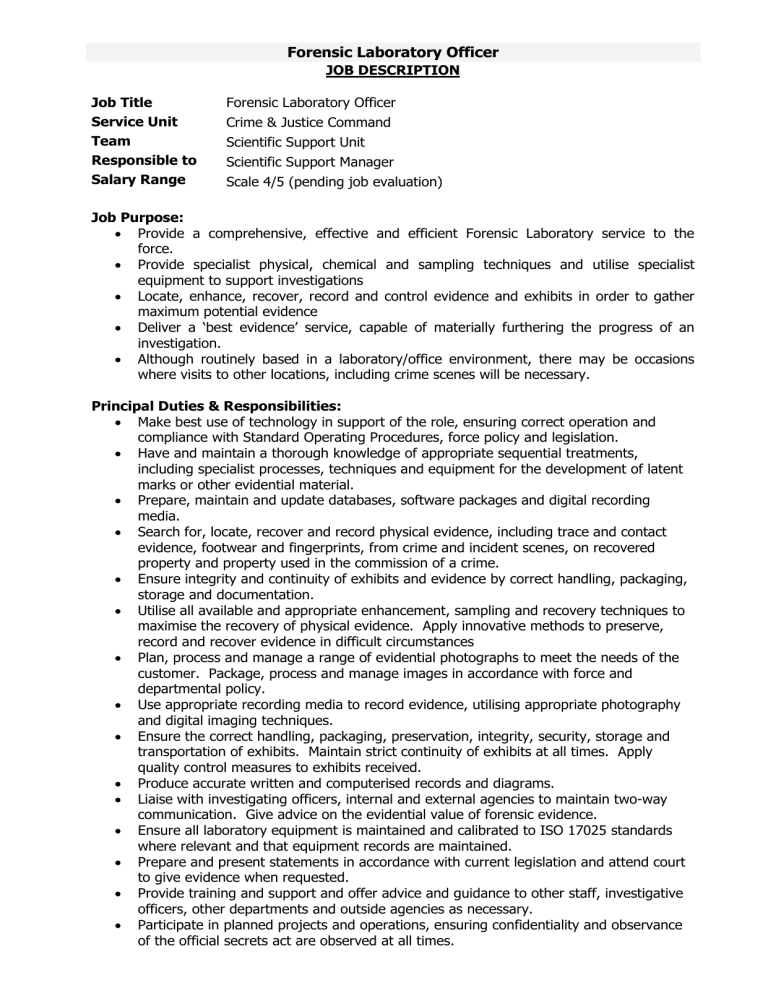
Forensic Laboratory Officer
JOB DESCRIPTION
Job Title
Service Unit
Forensic Laboratory Officer
Crime & Justice Command
Scientific Support Unit Team
Responsible to
Salary Range
Scientific Support Manager
Scale 4/5 (pending job evaluation)
Job Purpose:
Provide a comprehensive, effective and efficient Forensic Laboratory service to the force.
Provide specialist physical, chemical and sampling techniques and utilise specialist equipment to support investigations
Locate, enhance, recover, record and control evidence and exhibits in order to gather maximum potential evidence
Deliver a ‘best evidence’ service, capable of materially furthering the progress of an investigation.
Although routinely based in a laboratory/office environment, there may be occasions where visits to other locations, including crime scenes will be necessary.
Principal Duties & Responsibilities:
Make best use of technology in support of the role, ensuring correct operation and compliance with Standard Operating Procedures, force policy and legislation.
Have and maintain a thorough knowledge of appropriate sequential treatments, including specialist processes, techniques and equipment for the development of latent marks or other evidential material.
Prepare, maintain and update databases, software packages and digital recording media.
Search for, locate, recover and record physical evidence, including trace and contact evidence, footwear and fingerprints, from crime and incident scenes, on recovered property and property used in the commission of a crime.
Ensure integrity and continuity of exhibits and evidence by correct handling, packaging, storage and documentation.
Utilise all available and appropriate enhancement, sampling and recovery techniques to maximise the recovery of physical evidence. Apply innovative methods to preserve, record and recover evidence in difficult circumstances
Plan, process and manage a range of evidential photographs to meet the needs of the customer. Package, process and manage images in accordance with force and departmental policy.
Use appropriate recording media to record evidence, utilising appropriate photography and digital imaging techniques.
Ensure the correct handling, packaging, preservation, integrity, security, storage and transportation of exhibits. Maintain strict continuity of exhibits at all times. Apply quality control measures to exhibits received.
Produce accurate written and computerised records and diagrams.
Liaise with investigating officers, internal and external agencies to maintain two-way communication. Give advice on the evidential value of forensic evidence.
Ensure all laboratory equipment is maintained and calibrated to ISO 17025 standards where relevant and that equipment records are maintained.
Prepare and present statements in accordance with current legislation and attend court to give evidence when requested.
Provide training and support and offer advice and guidance to other staff, investigative officers, other departments and outside agencies as necessary.
Participate in planned projects and operations, ensuring confidentiality and observance of the official secrets act are observed at all times.
To be familiar and comply with all relevant Health and Safety, operational, Data protection, risk management, COSHH and ISO regulations.
Conduct Laboratory based examinations: Treat recovered exhibits sequentially with appropriate physical, chemical and technical processes. All chemical techniques must be applied in accordance with the current Home Office produced Manuals and comply with
Health and Safety regulations.
Examine for and recover indented impressions including but not exclusively, fingerprints, footwear marks and indented or altered documents.
Analyse, evaluate, label and assess all physically and chemically treated items for finger marks, footwear marks and trace evidence.
To prepare appropriate chemical solutions for treatments to be carried out and ensure stock levels of chemicals and materials.
Undertake forensic trace evidence collection including but not exclusively, swabbing and taping of exhibits, associated recording and photography and subsequent sequential examinations.
Maintain detailed contemporaneous notes for all laboratory and crime scene based examinations, ensuring that continuity, security, traceability, data protection and disclosure guidelines are adhered to at all times.
Prepare, use and maintain equipment and chemicals in the unit in accordance with force and national policies, the Health and Safety at Work Act, COSHH and ISO regulations and keep strict control and management of substances, consumables and equipment, held under licence by the unit for inspection by HM Customs & Excise. Ensure appropriate safe containment, management and disposal of chemicals and chemical waste whilst maintaining Health and Safety standards at all times.
Undertake routine maintenance and cleaning of the unit and equipment, including the
Trace Evidence Recovery Facility, to ensure the efficient and safe operation of laboratory processes whilst minimising the risk of cross contamination. Ensure that cleaning schedules are updated and maintained as a permanent record.
Support, adhere to, comply with, use and participate in the Quality Management
System, including the Quality Procedures, Quality Manual, Standard Operating
Procedures, Technical Procedures and all documentation relating to ISO accreditation processes and the Quality Management System, to ensure that Quality Standards are met at all times.
Prioritise and complete tasks to meet specific deadlines
Provide ad-hoc cover in other sections of the Scientific Support Unit and/or undertake any other duties, commensurate with your skills, when requested by a supervisor
Attend alternative locations and crime scenes when requested to perform specialised physical and chemical techniques as directed by a supervisor, including non destructive high intensity light source examinations to secure physical and trace evidence whilst ensuring that Health and Safety is not compromised.
Prepare and present reports and statements in accordance with current legislation and attend court to give evidence when requested.
Attend training courses, conferences and development days commensurate with the responsibilities of the post to attain and maintain a contemporary knowledge of developments in the fields of Crime Scene Investigation and Forensic Science and show continuing professional development.
NOTE:
The above list is not exhaustive and other duties commensurate with the grade and general nature of the post may, from time to time, be required. In addition, there may be some variation and/or development of the above duties and responsibilities without changing the general nature of the post
All employees are to comply with confidentialities and principles laid down in the Data Protection Act
(DPA) and the Management of Police Information (MOPI). All post holders to comply with health and safety legislation.
All employees are expected to demonstrate a commitment to the principles of equality of opportunity and fairness of treatment for all within Cleveland Police.
Forensic Laboratory Officer
Person Specification
The below list is included as a guide to help you establish the essential / desirable knowledge, skills, and experience of the role in accordance with the Force core values:
Force Values Desirable knowledge, skills, and experience Essential knowledge, skills, and experience
Knowledge and
Qualifications
Experience
Skills and
Abilities
Excellent working knowledge and practical experience of forensic and/or crime scene work
College of Policing: Forensic Laboratory Officer Qualification or equivalent
(e.g. FERRT/NPIA forensic Laboratory Officer)
Good working knowledge of the law, police practices and crime scene examination work
Understanding of Quality Management Systems and British Standard
ISO/IEC 17025:2005
Ability to plan and prioritise resources effectively in order to deliver a quality service
Familiarity with the Home Office (CAST) manual of fingerprint development techniques
Understanding of ‘Best Value and Best Evidence’ principles and how this impacts on forensic submissions.
Excellent interpersonal and communication skills, both written and verbal
Demonstrates an ability to deal with distressing, traumatic and emotional situations
Has the ability to deal with sensitive work situations with confidence and discretion whilst treating all people with dignity and respect.
Excellent interpersonal and communication skills, both written and verbal
Has the ability to work successfully as part of a team but confident to work individually with a minimum of supervision
Has the ability to make reasoned decisions and take responsibility for actions
Excellent organisational and customer service skills
Accredited qualification, degree or professional diploma in a forensic laboratory related subject or a related topic
Experience/Qualification in Quality Management
Experience of working within a laboratory accredited to BS ISO/IEC 17025:2005
Proven ability to undertake research into new projects and ideas relating to working practices
Knowledge of forensic intelligence issues
Experience of working within a similar role
Excellent IT skills
Experience of auditing
Ability to train, mentor and coach staff
Ability to give presentations
Previous experience of working within a police forensic laboratory
Other
Able to give attention to detail and an ability to identify small features
Has a flexible approach to meet the needs of the post and is prepared to work unsociable hours when required
Knowledge/experience of Health & Safety issues, including COSHH.
Policing Professional Framework
Practitioner (Constable and Police Staff Practitioner)
Personal Qualities
Serving the Public
Openness to change
Service Delivery
Professionalism
Decision Making
Working with
Others
The list below is the personal qualities that candidates will be measured on at interview.
The qualities are adapted from the Policing Professional Framework.
Behavioural indicators
Demonstrates a real belief in public service, focusing on what matters to the public and will best serve their interests. Understands the expectations, changing needs and concerns of different communities, and strives to address them. Builds public confidence by talking with people in local communities to explore their viewpoints and break down barriers between them and the police. Understands the impact and benefits of policing for different communities, and identifies the best way to deliver services to them. Works in partnership with other agencies to deliver the best possible overall service to the public.
Positive about change, adapting rapidly to different ways of working and putting effort into making them work. Flexible and open to alternative approaches to solving problems. Finds better, more cost-effective ways to do things, making suggestions for change and putting forward ideas for improvement. Takes an innovative and creative approach to solving problems.
Understands the organisation's objectives and priorities, and how own work fits into these. Plans and organises tasks effectively, taking a structured and methodical approach to achieving outcomes. Manages multiple tasks effectively by thinking things through in advance, prioritising and managing time well. Focuses on the outcomes to be achieved, working quickly and accurately and seeking guidance when appropriate.
Acts with integrity, in line with the values and ethical standards of the Police Service. Takes ownership for resolving problems, demonstrating courage and resilience in dealing with difficult and potentially volatile situations. Acts on own initiative to address issues, showing a strong work ethic and demonstrating extra effort when required. Upholds professional standards, acting honestly and ethically, and challenges unprofessional conduct or discriminatory behaviour. Asks for and acts on feedback, learning from experience and developing own professional skills and knowledge. Remains calm and professional under pressure, defusing conflict and being prepared to step forward and take control when required.
Gathers, verifies and assesses all appropriate and available information to gain an accurate understanding of situations. Considers a range of possible options before making clear, timely, justifiable decisions. Reviews decisions in the light of new information and changing circumstances.
Balances risks, costs and benefits, thinking about the wider impact of decisions. Exercises discretion and applies professional judgement, ensuring actions and decisions are proportionate and in the public interest.
Works co-operatively with others to get things done, willingly giving help and support to colleagues. Is approachable, developing positive working relationships. Explains things well, focusing on the key points and talking to people using language they understand. Listens carefully and asks questions to clarify understanding, expressing own views positively and constructively. Persuades people by stressing the benefits of a particular approach, keeps them informed of progress and manages their expectations. Is courteous, polite and considerate, showing empathy and compassion. Deals with people as individuals and addresses their specific needs and concerns. Treats people with respect and dignity, dealing with them fairly and without prejudice regardless of their background or circumstances.

